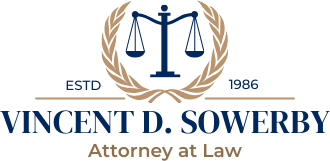Georgia Personal Injury Attorney
Fighting for Maximum Compensation After Your Injury – Serving All of Georgia
When someone else’s negligence causes you harm in Georgia, you deserve full compensation for your losses. Attorney Vince Sowerby provides aggressive representation for injury victims throughout the Peach State, helping you recover damages for medical bills, lost wages, pain and suffering, and more. From Atlanta to Savannah, Augusta to Columbus, we fight to protect your rights and secure the maximum compensation you deserve under Georgia law.

Why Choose Vince Sowerby for Your Georgia Personal Injury Case?
When you’re injured in Georgia, you need an attorney who understands the state’s unique legal landscape and insurance practices. Attorney Vince Sowerby brings extensive experience in Georgia personal injury law, combined with a personalized approach that puts your recovery first.
Unlike larger firms where you’re passed between paralegals and junior associates, you’ll work directly with Attorney Sowerby throughout your entire case. We take the time to understand the full impact of your injuries on your life, then fight aggressively to recover every dollar you deserve under Georgia law.
- No Fees Unless We Win – You pay nothing upfront, and our fees come only from your settlement or verdict
- Personalized Attention – You work directly with Attorney Sowerby, not a case manager
- Trial-Ready Representation – We prepare every case for court, which leads to better settlements

Types of Personal Injury Cases We Handle in Georgia
Our Georgia personal injury law firm represents victims of all types of accidents and injuries caused by negligence. We have the experience and resources to take on complex cases and fight against large corporations and insurance companies throughout the state.
Car Accidents
Rear-end collisions, T-bone crashes, head-on accidents, drunk driving, distracted driving, and hit-and-run cases throughout Georgia.
Medical Malpractice
Surgical errors, misdiagnosis, medication mistakes, birth injuries, and hospital negligence in Georgia facilities.
Truck Accidents
Commercial vehicle crashes, 18-wheeler accidents, delivery truck collisions on I-75, I-85, I-20, and other Georgia highways.
Wrongful Death
Fatal accidents caused by negligence, helping families recover damages under Georgia’s wrongful death statutes.
Motorcycle Accidents
Motorcycle crashes caused by driver negligence, road hazards, or defective equipment on Georgia’s roads.
Premises Liability
Injuries on commercial or residential property due to owner negligence and dangerous conditions under Georgia law.
Slip and Fall
Injuries on unsafe property including wet floors, uneven surfaces, inadequate lighting, and negligent maintenance.
Product Liability
Defective products, dangerous medications, faulty equipment, and consumer product injuries.
What Compensation Can You Recover?
Every personal injury case is unique, and the compensation you may recover depends on the severity of your injuries and their impact on your life. We fight to recover maximum compensation for all your damages, including:

Economic Damages
- Medical expenses (past and future)
- Hospital and emergency room bills
- Surgery and rehabilitation costs
- Prescription medications
- Physical therapy and ongoing treatment
- Lost wages and income
- Loss of earning capacity
- Property damage
Non-Economic Damages
- Pain and suffering
- Emotional distress
- Loss of enjoyment of life
- Permanent disability or disfigurement
- Loss of consortium
How Personal Injury Claims Work in Georgia
Free Consultation
We review your case at no cost, explain your rights under Georgia law, and outline your legal options for pursuing compensation.
Investigation & Evidence Gathering
We immediately begin investigating your accident, collecting evidence, obtaining police reports, interviewing witnesses, and consulting medical experts to build your case.
Insurance Claim Filing
We handle all communication with insurance companies, file claims against all liable parties and their insurers, and protect you from bad faith tactics.
Demand & Negotiation
We prepare a comprehensive demand package documenting your injuries and losses under Georgia law, then negotiate aggressively for maximum settlement value.
Litigation (If Necessary)
If the insurance company refuses fair compensation, we file a lawsuit in Georgia courts and prepare your case for trial. Our trial-ready approach often leads to better settlements.
Recovery
Once we secure compensation through settlement or verdict, we ensure you receive every dollar you’re owed, with medical liens properly resolved under Georgia law.

Dealing with Georgia Insurance Companies

Insurance Companies Are Not On Your Side
Insurance adjusters in Georgia use specific tactics to minimize what they pay, including:
- Quick lowball offers before you know the full extent of your injuries
- Recorded statements designed to trap you into admissions
- Delay tactics hoping you’ll accept less out of desperation
- Surveillance to undermine your injury claims
- Comparative fault arguments to reduce or eliminate your recovery
- Disputes over causation claiming pre-existing conditions caused your injuries
How We Protect You
We handle all insurance communications, prevent you from making harmful statements, document the full extent of your injuries, counter comparative fault allegations, prove causation with medical evidence, and demand maximum compensation based on Georgia law.
What to Do After an Injury
The steps you take immediately after an accident can significantly impact your ability to recover compensation:
1. Seek Medical Attention
Your health comes first. Get immediate medical care, even if you don’t think you’re seriously injured. Some injuries have delayed symptoms.
4. Preserve Evidence
Keep damaged clothing, equipment, or other items. Don’t repair property damage until it’s been documented.
2. Report the Incident
Call police for accidents. Report falls or injuries to property owners. Create an official record of what happened.
5. Avoid Social Media
Don’t post about your accident or injuries online. Insurance companies monitor social media to find information to use against you.
3. Document Everything
Take photos of the scene, your injuries, and any damage. Get witness names and contact information.
6. Contact an Attorney
Speak with a personal injury lawyer before talking to insurance companies. We protect your rights from day one.
Understanding Georgia's Personal Injury Laws
Georgia's Modified Comparative Negligence Rule
Georgia follows a modified comparative negligence system with a 50% bar rule. If you’re found to be 50% or more at fault for your injuries, you cannot recover any damages. If you’re less than 50% at fault, your compensation is reduced by your percentage of fault. This makes it crucial to have an experienced attorney who can minimize any allegations of your fault.
Georgia’s Statute of Limitations
In Georgia, you generally have two years from the date of injury to file a personal injury lawsuit. However, there are important exceptions:
- Medical malpractice: 2 years from discovery (with maximum 5-year statute of repose)
- Wrongful death: 2 years from date of death
- Claims against government: Notice requirements within 6 months to 1 year, depending on entity
- Product liability: Generally 2 years from date of injury
- Minors: Extended deadlines may apply for injuries to children
Missing the deadline means losing your right to compensation forever. Contact us immediately to protect your claim.

Georgia's At-Fault Insurance System

Georgia is an At-Fault State
Unlike Florida’s no-fault system, Georgia follows traditional at-fault insurance rules. This means:
- The at-fault driver’s insurance pays for injuries and damages
- You can file a claim directly against the responsible party
- You can pursue full compensation without PIP limitations
- You may use your own insurance if the at-fault driver is uninsured
Required Insurance in Georgia
Georgia requires minimum liability coverage of:
- $25,000 per person for bodily injury
- $50,000 per accident for bodily injury
- $25,000 per accident for property damage
These minimums are often inadequate for serious injuries. We pursue all available sources of compensation, including underinsured motorist coverage and defendant assets.
Frequently Asked Questions - Georgia Personal Injury
How much is my Georgia personal injury case worth?
The value depends on many factors including severity of injuries, medical expenses, lost income, degree of fault, insurance coverage limits, and impact on your life. Georgia’s modified comparative negligence rule means your recovery is reduced by your percentage of fault (and barred if 50% or more at fault). We provide honest case evaluations during free consultations.
How does Georgia’s comparative fault rule work?
Georgia uses a “50% bar” rule. If you’re less than 50% at fault, you can recover damages reduced by your percentage of fault. For example, if you’re 30% at fault in a $100,000 case, you’d recover $70,000. If you’re 50% or more at fault, you cannot recover anything. This makes legal representation crucial to minimize fault allegations.
What if the at-fault driver doesn’t have insurance in Georgia?
You may recover through your own uninsured/underinsured motorist (UM/UIM) coverage if you have it. We can also pursue the at-fault party’s personal assets. Georgia requires liability insurance, but many drivers violate this law or carry only minimum coverage inadequate for serious injuries.
How long do I have to file a personal injury lawsuit in Georgia?
Generally two years from the date of injury, but there are exceptions for medical malpractice (2 years from discovery, 5-year maximum), wrongful death, and claims against government entities. Missing the deadline means losing your right to compensation forever. Contact us immediately.
Can I recover damages if the accident was partially my fault?
Yes, as long as you’re less than 50% at fault. Georgia’s modified comparative negligence reduces your compensation by your percentage of fault. If you’re 20% at fault, you recover 80% of your damages. If you’re 50% or more at fault, you recover nothing.
Should I give a recorded statement to the insurance company?
No, not without consulting an attorney first. Insurance adjusters use recorded statements to trap you
